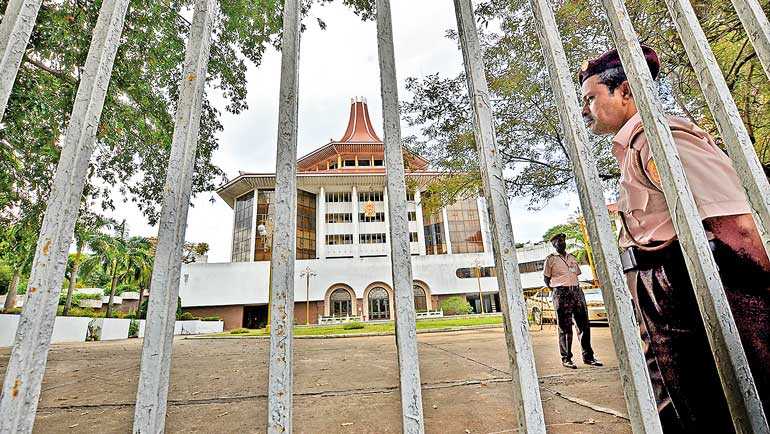Friday Feb 20, 2026
Friday Feb 20, 2026
Tuesday, 16 July 2019 00:00 - - {{hitsCtrl.values.hits}}

By the non-implementation of capital punishment we may see the death of a sentence, but by failing to act firmly against economic crimes, we may be ensuring the death of a nation – Pic by Shehan Gunasekara
Many a voice has been raised against the carrying out of the death sentence in Sri Lanka. It is inhumane, offends human rights, the State should not kill, the possibility of an error in the judicial process leading to the death of an innocent person cannot be completely ruled out, argue those who oppose Capital punishment. They also assert that there is no convincing evidence of the death sentence acting as a deterrent. In other words, a potential criminal will not be deterred by the inevitable punishment.
On the other hand, those who want the death sentence given effect, point to the rapid deterioration of law and order in the country, the near anarchy in a society wholly immersed in the worship of mammon. Out there is a free for all, with no rules; only the strongest, the most corrupt and cunning thrive. Dealing in drugs, next to politics, is the fastest way to fame and fortune. 
Capital punishment has been with us for as long as man was socialised, since ‘justice’ became a communal matter, his life and limb a concern of the tribe. With time, concepts of justice evolved, adjusting to the needs of the day. Not only an eye for eye or a life for life, but there were other transgressions for which the death sentence became mandatory. Even today, offences like high treason, piracy and even religious heresy could result in the offender being put to death.
In early 19th Century United Kingdom, there were about 200 ‘offences’ which carried the penalty of death. These included stealing, poaching, using disguises when committing a crime and keeping the company of a gypsy for more than a month! Europe was not much different, ‘witches’ being burnt alive was a common happening!
In military matters, especially under the stress of war, punishment with death, often by a firing squad, is common. During World War 2, particularly in the gigantic clash between Germany and Russia, a sentry would be shot for falling asleep during his watch, many lives depended on him keeping awake in the freezing night. Several mid-level commanders, especially on the Russian side, who had pulled back their soldiers, without orders, were summarily shot. The argument that the situation had become impossible and the only way to save the lives of his soldiers was to retreat did not hold water. He had no orders to retreat, the line must be held regardless of the consequences!
Even civilians were not spared, there are cases where running a black-market, war racketeering, loose talk amounting to spreading panic, cost the life of the offender.
By binding protocols, the European Union has abolished capital punishment. Following suit, the United Kingdom abolished the death penalty in their country. However, the titans; the United States of America, Russia and China, grappling with different realities, have retained the punishment, carrying out executions as per the law.
India too carries out the death sentence, though only sparingly. It is noteworthy that in 2012 India voted against a United Nations resolution to abolish the death penalty. Singapore, often considered a model, administers the ultimate punishment, in the 1994-98 era attaining the status of one of the highest per Capita execution countries in the world, a record of 13.8 executions per million. These were the years when Singapore was cementing its First World country status. They were determined.
Obviously, a society’s attitude towards the punishment of its transgressors varies with the times and the challenges facing it. Since the end of World War 2, Europe, including the UK, has enjoyed prosperity, peace and a social cohesion of an unusual quality. But nothing is permanent, history tells us. Already, there are voices in Britain, calling for restoration of the capital punishment for serious crimes. Now that they are out of the European Union, it could happen sooner than expected.
While the victims of the drug addiction are visible and could be counted, the victims of economic crimes are difficult to define and uncountable. By their deeds, the whole population is victimised; condemned to lives of hardship in a struggling economy. How do we deal with the endemic economic crimes?
In the case of Europe, as long as no huge stresses threaten its social fabric, the covenant would hold. Nevertheless, there are obvious destabilising forces at work in the continent, the endless stream of refugees to Europe being primary; from deprived backgrounds, very different cultures, strangers to Europe’s spirit and ideals.
On a hypothetical basis, if some of these refugees carry out bomb attacks like what happened on 21 April in Sri Lanka, things could change very fast. Let us say a terrorist aged 25 carries out such an attack in Europe taking 200 innocent lives. He is brought before a court of law and sentenced to a term of life imprisonment. Much has been done to improve prison conditions in Europe. This 25-year-old terrorist will enjoy a relatively comfortable existence in jail, save the loss of his freedom. With the various remissions for good behaviour, the man could be out in the streets of Paris or Berlin by the time he reaches 45.
May such a scenario never happen, but if it were to, the European attitude towards capital punishment is bound to be revisited.
Given Sri Lanka’s economic as well as social vulnerabilities, indiscipline, failings and confusions, it is interesting that the death penalty for drug peddling has come to the fore of public discourse. As we have proved repeatedly, high volubility does not mean superior performance; big talk, small deeds is our national emblem. Typically, while the house is on fire, we are making debating points.
The motivation for the current push to implement the death sentence is the spreading menace of drugs (the penalty is already in the law). It is evident that the younger generation is particularly vulnerable to its cruel attraction. Many a life has been ruined by the drug-addiction.
We ignore a social menace to our peril. Today, more than drugs, more than petty crime, it is the greed of the deal makers that sucks the land dry, leaving a country despoiled and forlorn.
While we cry to soften the punishment for drug offences, there are transgressions, particularly in the larger area of the economy, which do greater damage to the country.
A drug pusher may destroy hundreds. But in economic crime, the victims are in the millions, dooming even the unborn.
A businessman bribes his way to a road contract. When the average cost of such a road is one million, he wins it at an overblown three million (profits to be shared with the decision makers who fix the exaggerated cost and facilitate the crime). Had it been done at the acceptable one million, there is a saving of two million which could have gone towards health and educational needs of the nation. Paying such inflated amounts to contractors, the Government runs out of money. As a result, they cut down on welfare measures and increase the tax burden. Business entities cannot afford these taxes, so they either close down or down-size, adversely impacting the entire economy.
The road built by the corrupt contractor is poorly constructed. After a short period of time, it needs repairs. Again, the Government has to raise money to meet these additional costs (of the road). According to knowledgeable sources, the cost of generating electricity in the country per unit is half of what we pay for the periodic emergency power purchased from outside sources. For a small coterie of ‘operators’ entrenched in the power sector; what is economical as well as of long-term benefit to the country, cannot be allowed. Self-sufficiency in energy goes counter to their designs. These unscrupulous wheeler dealers have corrupted the entire sector. The amounts stolen from the country in this manner amount to billions of rupees.
Compared to the scope of these economic criminals, a drug peddler’s impact is limited. While the victims of the drug addiction are visible and could be counted, the victims of economic crimes are difficult to define and uncountable. By their deeds, the whole population is victimised; condemned to lives of hardship in a struggling economy.
How do we deal with the endemic economic crimes?
When there is such strong objection to the carrying out of the prescribed death sentence for drug-related crimes, where the victims are visible, it is difficult to envisage this country seriously getting down to dealing with its economic criminals, the corrupters whose activities have robbed the whole nation of a tomorrow.
By the non-implementation of capital punishment we may see the death of a sentence, but by failing to act firmly against economic crimes, we may be ensuring the death of a nation.